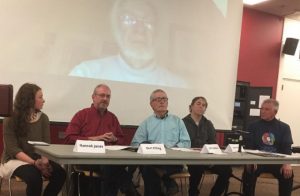FREE FLOW OF INFORMATION
An article by John Darling for the Ashland Tidings
In a time of alternate facts, public bullying and intense polarization of our public life, how can we use the media to foster a culture of peace, rather than violence? That’s the question addressed Monday by a panel at Southern Oregon University called “Cultivating a Culture of Peace in an Era of Trump: What’s the Media’s Role?”

Photo by John Carling
Click on the image to enlarge
Citing the “unprecedented antagonism of the Trump administration to media,” Jeff Golden, producer of “Immense Possibilities” on Southern Oregon Public TV, said our challenges didn’t start Jan. 20, because, years ago, much of the media abandoned its role in public service and became driven by profit.
This trend greatly increases the need for independent media, he notes, and much of it can flower on the internet.
“We’d be in much deeper trouble than we are now if not for independent media. Our challenge is very deep,” he said.
In the process, the journalist who supports a culture of peace “may not appear very peaceful. Journalists have to be combative and warriors for our own rights. You’ll do a more valuable job building a culture of peace than those who want to lie down.”
David Wick, executive director of Ashland Culture of Peace Commission, agreed, noting, “We’re not saying ‘let’s all just be peaceful.’ There always will be conflict, but peace is a powerful force. It’s not just sitting by the river on Lullaby Lane.”
The discussion is part of Independent Media Week, now in its 13th year. Sponsors include KSKQ Community Radio, the Ashland Culture of Peace Commission, Southern Oregon Jobs With Justice and the UN Club of SOU.
Its goals include “transforming attitudes, behaviors and institutions (for) harmonious relationships, (especially now) when the information landscape has been roiled by new national leadership.” It’s theme this week is “A well-informed citizenry is a cornerstone of democracy.”
(Article continued in the right column.)
Free flow of information, How is it important for a culture of peace?
(Article continued from left column)
Hannah Jones, editor of SOU’s The Siskiyou newspaper, says the election “totally polarized us” leading her to “feel like a watchdog against someone who told us we’re wrong. We report the verifiable truth. It’s so easy to attack each other but that gets us in a culture of war and hate. People say journalism is dying, but it mustn’t.”
Several panelists referred to the slogan, “Speak truth to power,” coined by Bayard Rustin, a leader for social justice, nonviolence and gay rights, in 1942.
Journalists cyclically get too cozy with the powerful and begin to trust their sources too much, as happened with the widely liked Secretary of State Colin Powell as he claimed weapons of mass destruction in Iraq, said Jason Houk of Southern Oregon Jobs With Justice.
Jones responded with, “You can’t have peace without the truth.”
Seeking to avoid conflict has often led to the opposite of a culture of peace, added Golden, noting the mainstream media “failed in its job” by accepting the official story that Iraq had weapons of mass destruction, thus leading to a huge war.
“They didn’t want to be in conflict with President Bush,” he said, “and the results are there to see.”
Media are deeply self-examining now, as they were taught to be objective and balance opinions, said Golden, however, what do they do when faced with lies — and that the supposedly balancing point-of-view is comprised of alternate facts? And should journalists use the word “liar?”
David Adams, coordinator of the Culture of Peace News Network, and a creator of the Culture of Peace movement (speaking via a video link from New Haven, Conn.), said the trend is that more and more people, informed by media, want democracy and oppose war. However, the state has come to “monopolize the culture of war and use media as a weapon … while they create incidents (of conflict) to convince people they have to have war.”
Daily Tidings Editor Bert Etling, a member of the Ashland Culture of Peace Commission, cited the “hurricane” in Washington, advocating actions “opposite of the culture of peace,” fragmenting and setting religions against each other, and trying to frame media and politics as an “us vs them … degrading what the media says … and the value of the information.”